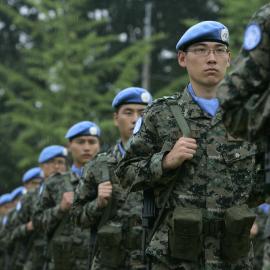In his interview with Foreign Affairs (“Generation Kill,” March/April 2013), Stanley McChrystal, the retired U.S. general, argued that the United States should compel all Americans to serve their country through some form of national service. Conscription, however, is not the answer to the United States’ challenges at home or abroad. Instead, Washington should build on the success of existing voluntary programs, such as the Peace Corps, to give more Americans the opportunity to advance U.S. foreign policy objectives by serving abroad.
The idea that compulsory service will strengthen society and boost civic engagement isn’t new. Around the turn of the twentieth century, the American philosopher William James suggested that youth be drafted by states to perform manual labor. In the process, James argued, they would “get the childishness knocked out of them, and . . . come back into society with healthier sympathies and soberer ideas.”
The reality, however, is far more complex. In order to forge the kinds of social ties that McChrystal envisions, national service has to provide prolonged, intensive opportunities for citizens of diverse backgrounds to interact. The U.S. draft during World War II strengthened social ties because it thrust millions of Americans together for a long period of time in a high-stakes environment. Minor tasks, such as rebuilding infrastructure, simply do not provide the same intensity of experience. Short of another theater war, it will be extremely difficult to replicate this sociological effect.
The country’s objectives would be far better served by expanding opportunities for national service through voluntary programs, particularly those that expose Americans to the outside world. The Peace Corps was established by President John F. Kennedy to make Americans return from abroad “better able to assume the responsibilities of American citizenship and with greater understanding of our global responsibilities.” The value of the Peace Corps has only increased over time, and expanding the program would be a sound investment in U.S. public diplomacy.
Currently, the Peace Corps provides fewer than 10,000 positions total despite receiving thousands of applications every year. The United States can and should encourage more Americans to serve their country both at home and abroad. But targeted investments in voluntary programs would advance U.S. interests far more effectively than compulsory national service.
SCOTT MOORE
Giorgio Ruffolo Doctoral Research Fellow, Belfer Center for Science and International Affairs, Harvard Kennedy School
